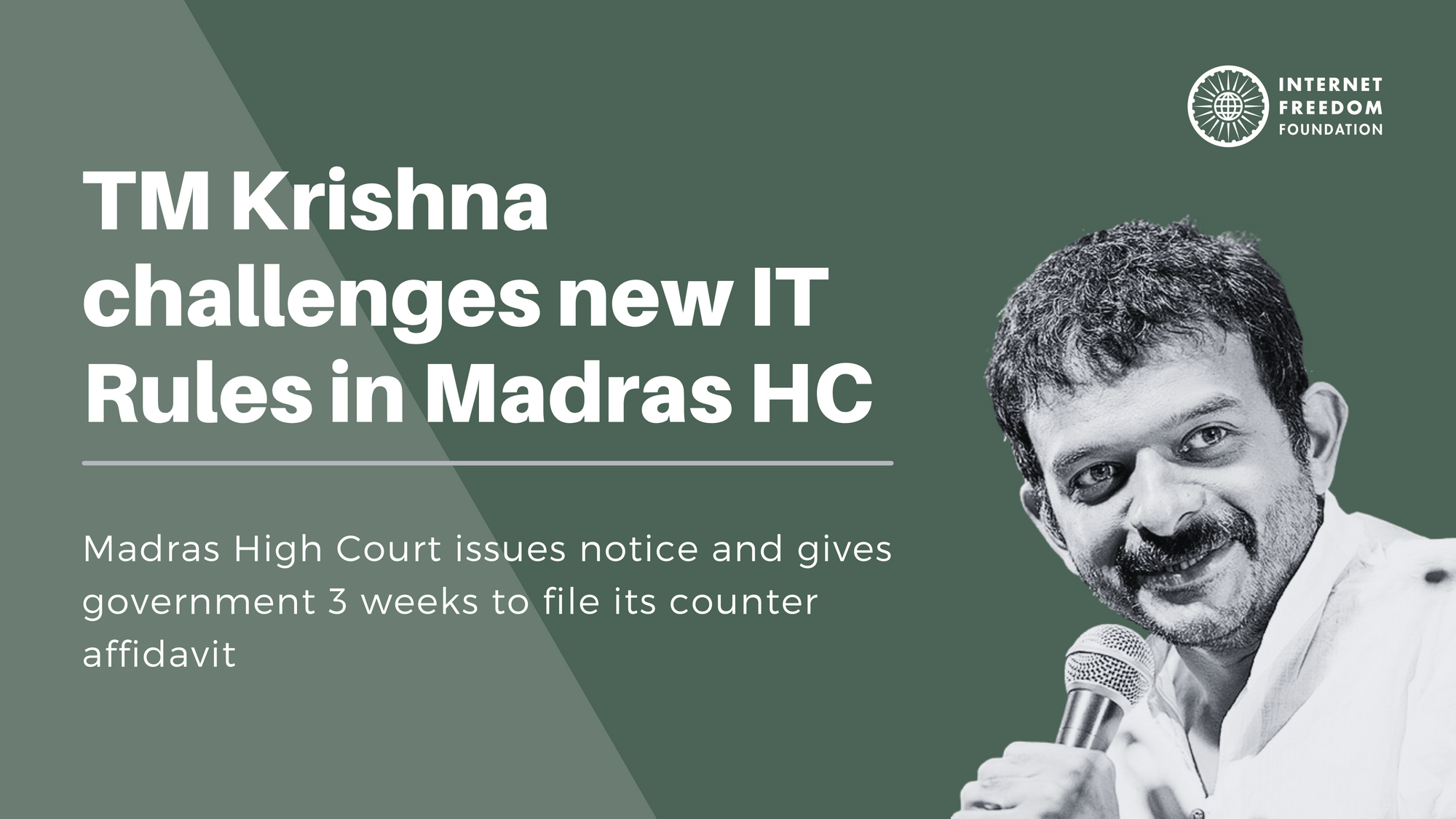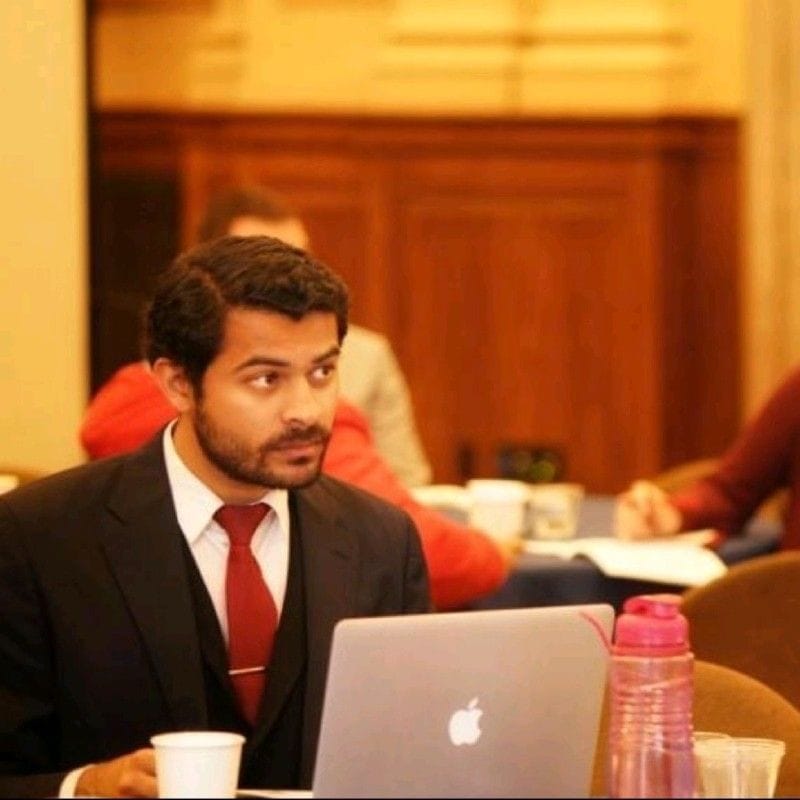
Tl;dr
Mr. T. M. Krishna, a prominent Carnatic music vocalist, cultural critic, and writer, approached us to file a writ petition before the Madras High Court, challenging the entirety of the Intermediary Rules, 2021. The writ petition came up for hearing before the Chief Justice of the Madras High Court on June 10, 2021. At the hearing, Mr. Parthasarthy, advocate for Mr. T. M. Krishna argued that the Rules impinge the fundamental rights of the Petitioner, and are ultra vires the parent act. The Madras High Court issued notice to the Respondents, gave them time to file their counter affidavit and the matter will be heard in four weeks.
Background
On February 25, 2021, the Ministry of Electronics and Information Technology and the Ministry of Information and Broadcasting released the Intermediary Rules 2021 (2021 Rules), which seek to increase the government control and regulation over social media intermediaries and the content posted on such intermediaries. The 2021 Rules also bring OTT platforms and digital news media platforms under the purview of the IT Act, under Part III thereof. Read our deep dive analysis of the 2021 Rules here, where we explain how the Rules are unconstitutional, undemocratic, and how fundamentally they will change the internet usage experience.
The Intermediary Rules 2021 have been challenged before other High Courts, including a petition before the Kerala High Court, where we are representing LiveLaw Media Pvt. Ltd. The Kerala High Court restrained coercive action against LiveLaw Media under Part III of the Intermediary Rules, 2021.
“Our Constitution contains a commitment to the liberty of imagination.”
Mr. T. M. Krishna, a prominent Carnatic music vocalist, cultural critic, and writer, approached us to file a writ petition before the Madras High Court, challenging the entirety of the Intermediary Rules, 2021. In his words,
“Without privacy it's impossible to create and perform. And the privacy that ought to be afforded to us all is intrinsically linked with our right to freedom of expression. Our Constitution contains a commitment to the liberty of imagination. Censorship sans reason offends this commitment. It is in furtherance of my rights to freedom of expression and privacy that I am filing the present writ petition. I submit that the Impugned Rules offend my right as an artist and cultural commentator by both imposing a chilling effect on free speech, and by impinging on my right to privacy.”
The petition challenges the Intermediaries Rules on five major grounds:
- The 2021 Rules violate freedom of speech under Article 19(1)(a) of the Constitution;
- The 2021 Rules violate the freedom to practice any profession under Article 19(1)(g) of the Constitution;
- The 2021 Rules violate the fundamental right to privacy under Article 21 of the Constitution;
- The 2021 Rules are manifestly arbitrary and suffer from excessive delegation, thus violating Article 14 of the Constitution; and
- The 2021 Rules are ultra vires the Information Technology Act, 2000;
The Intermediary Rules 2021 are particularly harmful to musicians, artists and creators such as Mr. Krishna, since the chilling effect they create “tends to altogether quell the creative process and makes it impossible for a person to think imaginatively, beyond conventional boundaries, and create art that is politically and socially salient.” Privacy also is an essential component of an artist’s rights since, “without the protection of privacy it is impossible for an artist to perform freely. The creative process, which might involve challenging existing social norms, whether it is norms concerning political views, views about religion, caste, and social life, or existing mores governing obscenity and sexuality, requires a space that is wholly secluded and private.”
Proceedings before the High Court of Tamil Nadu at Madras
The writ petition was filed before the Madras High Court on June 7, 2021 and came up for hearing before a division bench led by the Chief Justice of the Madras High Court on June 10, 2021. Mr. Krishna was represented by a team led by Advocate Suhrith Parthasarthy and consisting of Advocate Surasika Parthasarthy. The Internet Freedom Foundation provided legal assistance in the drafting and filing of the petition through Advocates Vrinda Bhandari, Abhinav Sekhri, Sanjana Srikumar, Tanmay Singh and Krishnesh Bapat.
Mr. Parthasarthy advanced oral arguments on behalf of Mr. T. M. Krishna and drew the Court’s attention to the five grounds taken in the petition, i.e. the 2021 Rules impinge upon different fundamental rights, and that the 2021 Rules are ultra vires the Information Technology Act, 2000.
Directions issued by the Madras High Court
The division bench of the Madras High Court comprising the Chief Justice of Tamil Nadu and Justice issued notice to the Respondents, which was accepted by an advocate representing the government. The Ministry of Electronics and Information Technology and the Ministry of Information & Broadcasting have been provided 3 weeks to file their counter affidavit, and the matter will be heard after 4 weeks.
We thank Mr. T. M. Krishna for giving us an opportunity to lend our expertise in this important case and are deeply grateful to all the lawyers who worked on this petition and especially Mr. Suhrith Parthasarthy who led the legal team.
We will update you on the next date of hearing.
Important Documents
- Writ Petition filed on behalf of Mr. T. M. Krishna (link)
- Previous post titled 'Deep dive : How the intermediaries rules are anti-democratic and unconstitutional.' dated 23.11.2020 (link)
- Previous post titled ‘Kerala HC restrains coercive action on the operation of Part III of the Intermediaries Rules, 2021 for LiveLaw' dated 10.03.2020 (link)

